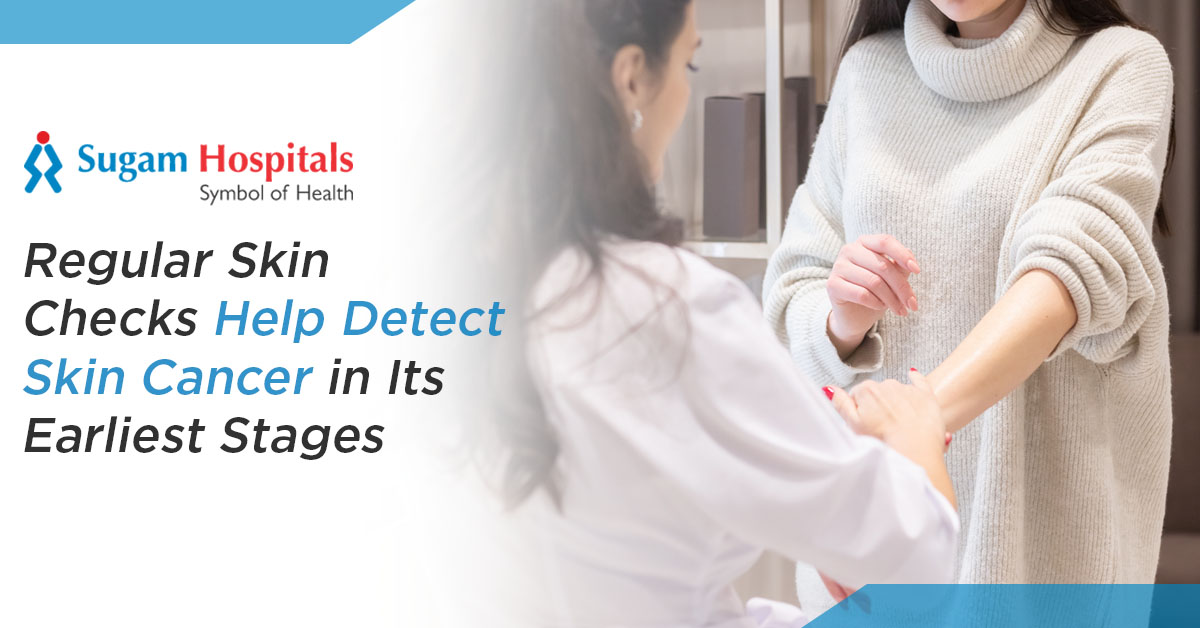Regular Skin Checks Help Detect Skin Cancer in Its Earliest Stages

Regular Skin Checks Help Detect Skin Cancer in Its Earliest Stages
November 18, 2025 by adminYour skin serves as the body’s largest organ, which is not only a protective barrier but also a silent storyteller of your health. Being constantly exposed to the environment, it can provide the earliest signs of a variety of serious diseases, among which is skin cancer.
The great news? Skin cancer if it is identified at the initial stage is commonly very curable. Hence the necessity of regular skin checks, both self-exams and professional screenings to locate the signs at the earliest stages.
Here In this blog, we are going to understand the different kinds of skin cancer, learn how to do a self-skin check, comprehend what signs to look for and discover the significance of professional screening.
The Three Faces of Skin Cancer: What You Need to Know
Skin cancer is not a single condition, it manifests in several different types, each with its characteristics.
- Basal Cell Carcinoma (BCC): The most prevalent form, is usually a bump of a pearly or waxy appearance. BCC generally behaves as a slow-growing tumor and almost never metastasizes.
- Squamous Cell Carcinoma (SCC): It is a solid, red nodule or a scaly, flat patch, usually. SCC can become metastasized if it is not given the proper treatment, hence the importance of early detection.
- Melanoma: The most life-threatening form, is typically developed in a mole that was already there or presented as a new dark spot. Melanoma can move very fast to other parts of the body, but when diagnosed at an early stage, the prognosis is very good.
UV exposure is the common factor that leads to these three types of skin cancer, but they can show up anywhere on the body. The earlier skin cancer is found, the better the chances of cure are, therefore, the importance of being aware.
Empower Yourself: How to Conduct a Monthly Self-Skin Check
A monthly self-examination of the skin is a simple, but highly effective method to notice small changes at an early stage:
- Get ready: A brightly lit room, a full-length mirror, and a hand mirror for those places that are difficult to see.
- Full-Body Scan: Feel the top of your head, face, ears, neck, chest, back, arms, hands, nails, legs, feet, soles and genital area. The spaces between fingers and toes should also be checked.
- Identify the “Ugly Duckling”: Pick out moles or spots which are different from the rest due to their shape, size or color.
- Being Regular: This examination needs to be done each month to be able to detect the slightest changes.
Monitoring any changes in moles or other skin spots is necessary for the early stage detection of skin cancer.
What to Look For: The ABCDEs of Melanoma and Other Warning Signs
The ABCDEs of melanoma are a set of characteristics that can assist a person in recognising a suspicious mole:
- A – Asymmetry: One side cannot be compared to the other.
- B – Border Irregularity: The edges are uneven, notched or blurred.
- C – Color: The colors are not even and may include brown, black, tan, red, white or blue.
- D – Diameter: The size is more than 6mm (about the size of a pencil eraser).
- E – Evolving: Any difference in the size, shape or color of the spot or new symptoms like itching, bleeding or tenderness.
Other signs that the skin may be cancerous (BCC/SCC) are:
- An open wound that does not heal
- A small lump or growth that looks glossy
- A red scab that is flaky
A doctor’s examination should be sought at once if there are any doubtful changes.
The Critical Role of Professional Skin Screenings
Self-assessment is really important, but it is not enough. Dermatologists apply their training and tools, like dermatoscopes, to find hidden or slightly changed skin. Routine check-ups by a doctor or more frequent visits for people with high-risk areas are the main factors in the early stages of skin cancer detection.
You can fight skin cancer to the highest extent by thoroughly examining your skin regularly at home and visiting a doctor. The professional check-up along with the home inspection makes you a step ahead of skin cancer. Thus, do not defer until it is too late. Early diagnosis is the greatest life saver. For a diagnosis and competence in care, make your visit at Sugam Hospital, the best cancer hospital in Chennai, the fastest call.

